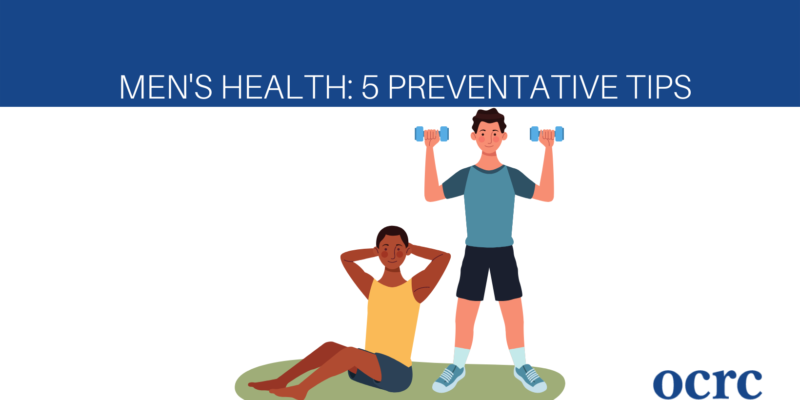
June is Men’s Health Month, and accordingly, it’s a great time to improve men’s awareness of preventative health care measures. According to the Centers for Disease Control and Prevention, men die five years earlier than women on average, and at higher rates of the leading causes of death: heart disease, cancer, and accidental injuries.
In addition to heart disease, cancer and injuries, men are also at higher risk of chronic lower respiratory disease, stroke, and liver disease. Fortunately, many of these common ailments can be prevented by implementing a few simple lifestyle changes.
If you’re a smoker, consider asking your doctor to help you quit. Even if you’ve never touched a cigarette, take precautions to avoid secondhand smoke or workplace chemicals. This will significantly lower your risk of chronic lower respiratory disease, which includes emphysema, chronic bronchitis, asthma, pulmonary hypertension, and lung disease.
Weight gain can lead to high cholesterol and blood pressure, which can result in an increased risk of heart disease and diabetes. A healthy diet consisting of vegetables, fruits, whole grains, high-fiber foods, and lean proteins will reduce your risk of more serious diseases and make you feel better in the long run.
Physical activity doesn’t mean you have to spend hours at the gym every week. Instead, choose an activity you enjoy, such as hiking, biking, playing a sport, or even just going for a daily walk. Just 30 minutes of activity each day can reduce the risk of heart disease, diabetes, and stroke; physical activity can also be a good mental break from the stresses of the day.
Men are far more likely to get alcoholic liver disease than women, which becomes more likely the more alcohol you consume on a long-term basis. Alcohol can also contribute to high blood pressure and an increased risk of heart attack and stroke. You don’t have to cut out alcohol completely, but moderation is key—this means a recommended maximum of two drinks per day if you are a man younger than 65 and one drink per day if you are older.
While we can’t necessarily get rid of everything that causes stress, we can decide how to manage it. It’s more difficult to maintain a healthy, balanced lifestyle if you are constantly feeling stressed out and under pressure. Too much stress can even weaken the immune system. Sleeping for at least 7-8 hours per night, getting enough physical activity, and making sure you have a healthy work-life balance can all aid in managing stress levels.
Of course, a healthy lifestyle isn’t a secret formula for an illness-free life. Be sure to go to the doctor on a regular basis; keep up with the recommended vaccinations and cancer screenings, and follow recommendations for any specific health issues you may be at risk for. Don’t neglect your mental health, either. Suicide is another leading health risk for men. In fact, on a global average, one man dies by suicide each minute of the day. Help is always available—talk to a doctor if you have signs or symptoms of depression.
Finally, be mindful of current COVID-19 safety protocols, regardless of age, sex, or medical history. Centers for Disease Control and Prevention and the World Health Organization provide plenty of information about the disease, including prevention tactics, frequently asked questions, and even COVID-19 clinical trials.
